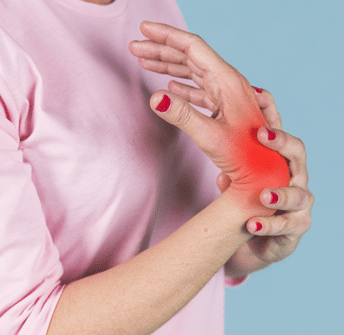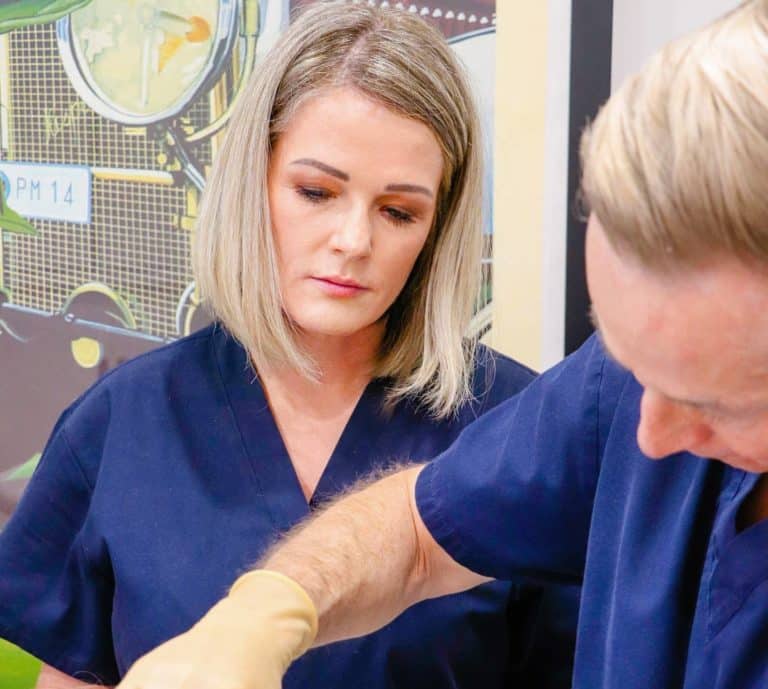Nerve Compression Syndrome – Cubital and Radial tunnel syndrome in Auckland NZ
Cubital tunnel and radial tunnel syndromes are both nerve compression syndromes of the arms and hands. They are very similar to the more famous carpal tunnel syndrome, however, they involve other nerves of the region.
These syndromes can cause pain, tingling, decreased sensation, and weakness in your hands and arms.
Carpal tunnel, cubital, and radial tunnel syndromes all share a common feature which causes these similar symptoms, and that is the increased pressure on one of the hand nerves. This can happen as a result of any disorder that squeezes the nerves as they travel in your arm.
The good news is that conservative treatment can be very effective in treating these disorders, and for those who have more severe symptoms, surgery to relieve the nerves is a good option.

Cubital Tunnel Syndrome
Overview of Cubital Tunnel Syndrome
Another name for cubital tunnel syndrome is “ulnar neuropathy”. The ulnar nerve is one of the nerves that supply the muscles and skin of your arm and hand. It is responsible for providing sensation in part of your forearm, wrist, your little finger, and part of your ring finger. It also supplies the majority of the muscles of your hand.
The ulnar nerve passes behind the elbow, right over the pointy bony part of the elbow closest to your body (also known as the “funny bone”). As it travels towards your hand, the ulnar nerve passes through a “tunnel” of muscles and connective tissue known as the “cubital tunnel”.
Symptoms of Cubital Tunnel Syndrome
Symptoms of cubital tunnel syndrome affect your forearm, hand, wrist, and little and ring fingers. You might experience one or more of the following:
- Pain
- Numbness
- Tingling (especially in the ring and little fingers)
- Hand muscle weakness
If the condition is left untreated, it can progress and cause you to lose the strength of your handgrip, and a claw-like deformity of the hand might develop. These symptoms are usually more pronounced when your elbow had been bent for a long time, like when sleeping or reading a book.
Causes of Cubital Tunnel Syndrome
Cubital tunnel syndrome can be caused by one of the following mechanisms:
- External pressure: Since the ulnar nerve passes very close to the skin with little protection over it, activities that put direct pressure on it (like leaning on your elbow, especially on a hard surface) can cause your symptoms.
- Stretching: Bending the elbow for extended periods of time can trigger the symptoms
- Anatomy: In some people, the nerve happens to pass in a way that makes it anatomically more vulnerable to external pressure
- Compression: The muscular, bony, or connective tissue that surrounds the ulnar nerve might become thick for some reason and compress the ulnar nerve as it passes through them
Radial Tunnel Syndrome
Overview of Radial Tunnel Syndrome
The radial nerve is a nerve that starts in your arm and travels all the way across your forearm to your hand. As it travels, it passes behind the outer prominence of your elbow, and then into a tunnel of muscle and connective tissue called “the radial tunnel”.
The radial nerve provides sensation to the skin on the backsides of your hand, forearm, and arm. It is also responsible for motor supply for several muscles in this region.
Symptoms of Radial Tunnel Syndrome
Symptoms of radial tunnel syndrome are slightly different from carpal tunnel and cubital tunnel syndromes:
- Pain: The pain is usually felt on the upper part of the backside of the forearm, and it’s frequently described as dull and aching.
- Muscle weakness: The muscles of the forearm are frequently affected, which causes weakness and fatigue in the forearm and wrist.
The symptoms become more exacerbated during activities that include stretching the forearm. Sensory symptoms such as tingling and numbness are less likely to occur with radial tunnel syndrome.
Causes of Radial Tunnel Syndrome
Anything that squeezes on the radial nerve can cause these symptoms. Some of the ways this can happen include:
- Muscle overuse: The radial nerve passes between two layers of muscles in the forearm (the radial tunnel). Overusing these muscles in physical activities like pushing, pulling, gripping, and bending the wrist can compress the nerve and cause your symptoms.
- Compression: Bone tumors, lipomas, and connective tissue inflammation can all press on your radial nerve and cause radial tunnel syndrome.
Diagnosis of Nerve Compression – Radial and Cubital tunnel syndrome
Dr Gittos can usually establish the correct diagnosis based on your symptoms and physical examination. Some extra tests that might be ordered:
- Blood work: Your doctor might order some blood tests to screen for conditions that might be related to your symptoms, such as diabetes or thyroid problems.
- Electromyography: This test measures the strength of the muscles of your arm and hand to see if there is any weakness
- Nerve conduction studies: This test measures how fast electrical impulses are traveling across your nerves to assess for any abnormalities.
Treatment for Radial and Cubital tunnel syndromes
Dr. Gittos might recommend one of several treatment options depending on the severity of your condition:
Conservative treatment for Nerve Compression
This includes:
- Avoiding activities that strain your radial or ulnar nerves
- Anti-inflammatory drugs to reduce inflammation and help control the pain
- Splinting of the elbow during sleep
- Wearing protective elbow padding
- Injecting corticosteroids into your elbow to reduce inflammation
- Physiotherapy

Surgical treatment for Nerve Compression
Surgery is usually reserved for those who do not respond to conservative treatment. During surgery, Dr. Gittos will perform one of several techniques to release your radial or ulnar nerves and reposition them into a more protected location.
The surgery is done on an outpatient basis (no need to spend the night at the hospital). Usually, you will be awake during surgery, and the surgery will be performed under regional anesthesia so that you won’t feel any pain.
Surgery provides relief of symptoms in up to 85% of people who have cubital tunnel syndrome, and is also effective in radial tunnel syndrome. After surgery, you will need some time to regain the full function of your arm and wrist. You might be asked to wear a splint for a few weeks, and full recovery might need several months with some physical therapy.
Dr. Gittos in Auckland NZ is experienced in hand surgery and treating nerve compression syndromes. Give us a call to learn more about your condition or to set up an appointment with Dr. Gittos for a full assessment.
Complications and Risks of Hand Surgery
Hand surgery incurs risks and complications like all invasive surgery. Dr Gittos will make you aware of potential complications during your consultation. This includes general anaesthesia risks, bleeding (Hematoma), infection, wound healing, deep vein thrombosis, scarring and numbness. Always stay informed and healthy, do NOT smoke before or after your procedure and read & understand your risks of surgery.
Medical Sources for Further Reading :
- ASSH Article on Cubital Tunnel Syndrome
- Pubmed medical article on Nerve Compression
- Brigham Hospital article on Radial Tunnel Syndrome
Finding a Hand Surgeon in Auckland
For many men & women in New Zealand suffering from hand or finger pain, having hand surgery is a life-changing experience. There are many qualified hand experts and plastic surgeons, but it is always best to find one who is experienced in hand surgery procedures. Find an experienced surgeon who you feel comfortable with and have a look at their online reviews to find out what their past patients say.
Why Choose Dr Mark Gittos?
Dr. Mark Gittos is a plastic surgeon in Auckland, New Zealand who has extensive experience in treating hand tumours such as ganglion cysts, giant cell tumours of the tendon sheath, epidermal inclusion cysts, and others. Call us to book an appointment or to learn more about the services we offer.Dr Gittos has a current FRACS membership and significant hand surgery experience.
Make an Appointment for a Hand Consultation with Dr Gittos
If you have any symptoms that might be related to a hand tumour, give us a call to make an appointment with Dr. Mark Gittos in Auckland, New Zealand. Dr. Mark is a plastic surgeon who is experienced in treating a wide range of hand disorders, such as trigger finger, De Quervain’s syndrome, cubital and radial tunnel syndromes, carpal tunnel syndrome, ligament disorders, and tumours or ganglions. Come visit us to get a full assessment of your condition and learn about your treatment options.
About Dr Mark Gittos FRACS (Plast) – New Zealand Plastic Surgeon
Practice locations in Herne Bay Auckland, Northland and Bay of Plenty – Kerikeri, Whangarei, New Plymouth & Tauranga
Dr Mark Gittos is a leading Specialist Plastic Surgeon and operates a practice in Herne Bay, Auckland and in the UK. The practice focuses on both surgical and non-surgical procedures, each designed to help restore, improve or change a physical characteristic or problem. The first step in every case is to talk through your personal requirements and explore all the options, before deciding on the most effective solution.
Dr Mark Gittos offers high quality, natural-looking cosmetic surgery results and is highly experienced in Breast, Body and Face Surgery having performed over 4000 Surgeries in the last 26 years. With worldwide expertise Dr Gittos is an expert in breast, face and body surgery for men & women.
Naturally, before any treatment is begun, we will explain clearly the advantages and risk factors; so that you have the information you need to make an informed decision that is best for you. Visit the practice to find out more.

NEXT STEPS
Please NOTE: Dr Gittos only performs surgery on non-smoker patients with a BMI less than 30. To check your BMI please visit the NZ Heart Foundation website. For help giving up smoking before surgery visit the Smoke Free website
Do your Research
- Read the Website and Blogs relevant to your procedure
- Browse our Frequently Asked Questions including how to choose a Surgeon for your procedure
- Download and read the FREE Guides to Surgery
What to Bring to your Plastic Surgeon Consultation
- Bring a friend or relative to help discuss the information and your choices
- Take lots of notes and read the documents provided thoroughly
- Dress in simple clothes as you may need to undress for examination
- Bring your medical referral and any relevant medical documents or test results
Book your Initial Surgery Consultation
- A Referral from your GP or specialist is helpful but NOT essential – you can have a consultation without a GP Referral
- Email us or Call on 09 529 5352 to arrange your surgeon consultation appointment.
- Book a consultation with Dr Gittos by paying the Consultation Fee – $350 incl GST
Traveling for Surgery? – Consider post-surgery luxury recovery in a Hotel with LuxeCare
Please contact us to arrange to book a consultation with our Specialist Plastic Surgeon or to speak with our Patient Care Advisor.
Send an enquiry form today or phone 09 529 5352 during Clinic Hours
